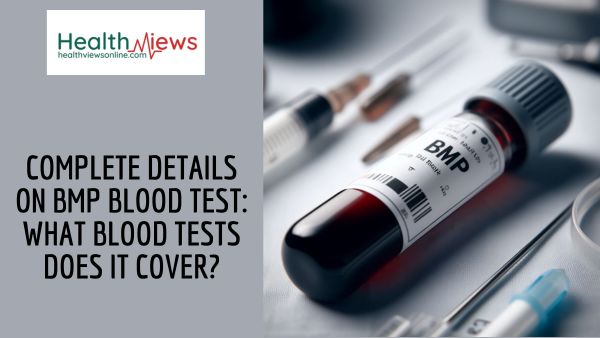What is a BMP blood test?
A BMP blood test (basic metabolic panel) is a regular blood test that offers significant information about a person’s overall health as well as the balance of electrolytes, fluids, and acids in their body. It usually consists of a battery of tests that analyze numerous compounds in the blood to evaluate the function of the kidneys, lungs, and other organs.
Also, Read Why Blood Donation is Important. Giving = Living
A BMP Blood Test measures several components of blood, including:
1. Glucose
This test determines the amount of glucose (sugar) in the blood. It helps in the diagnosis and monitoring of diseases like diabetes and hypoglycemia (low blood sugar).
What are the normal values of Glucose?
Both men and women: 70 to 99 mg/dL (milligrams per deciliter) or 3.9 to 5.5 mmol/L (millimoles per liter)
What does Low blood glucose indicate? Low blood glucose levels may suggest hypoglycemia, which can be caused by too much insulin, certain drugs, or an underlying medical problem.
What does High blood glucose indicate? High blood glucose levels may indicate diabetes mellitus, uncontrolled diabetes, or hyperglycemia caused by stress.
2. Calcium
It assesses the level of calcium in the blood, which is necessary for bone health, neuron function, and muscular contraction. Abnormal calcium levels can suggest a variety of medical issues.
What are the normal values of Calcium?
8.6 to 10.2 milligrams per deciliter (mg/dL) or 2.15 to 2.55 millimoles per liter (mmol/L).
What does Low Calcium indicate? Hypoparathyroidism, renal illness, vitamin D insufficiency, or malabsorption diseases can all cause low calcium levels.
What does High Calcium indicate? High calcium or Hypercalcemia can be caused by illnesses such as hyperparathyroidism, some malignancies, or an overabundance of vitamin D.
Also, watch health views web stories: 8 Foods That Fulfill Your Calcium Dose
3. Sodium
Sodium is an electrolyte that aids in fluid balance in the body. Dehydration, kidney difficulties, and other health concerns can all cause abnormal sodium levels.
What are the normal values of Sodium?
Usually between 135 to 145 milliequivalents per liter (mEq/L).
What does Low Sodium indicate? Low sodium levels can be caused by heart failure, kidney illness, the syndrome of inappropriate antidiuretic hormone (SIADH), or excessive water consumption.
What does High Sodium indicate? High sodium levels can arise as a result of dehydration, excessive salt consumption, or medical diseases such as Cushing’s syndrome.
4. Potassium
Potassium is another electrolyte that is important for muscle and nerve function. Potassium levels that are too high or too low might disrupt cardiac rhythm and muscle function.
What are the normal values of Potassium?
Between 3.5 to 5.0 milliequivalents per liter (mEq/L).
What does Low Potassium indicate? Low potassium levels can be caused by illnesses such as kidney disease, severe vomiting or diarrhea, or certain drugs.
What does High Potassium indicate? High Potassium or Hyperkalemia can be caused by kidney disease, certain medicines, or metabolic abnormalities.
5. Bicarbonate (CO2)
This test examines the amount of bicarbonate in the blood, which is vital for maintaining the body’s acid-base balance. It can aid in the evaluation of lung and renal function.
Also, Read 2023 Health Awareness Days, Weeks, and Months Calendar
What are the normal values of Bicarbonate?
Between 22 to 28 milliequivalents per liter (mEq/L).
What does Low Bicarbonate indicate? Low bicarbonate levels can be caused by kidney disease, diabetes, or some pollutants.
What does High Bicarbonate indicate? High bicarbonate levels can suggest metabolic alkalosis, which can be caused by overuse of antacids, vomiting, or kidney problems.
6. Chloride
Chloride is an electrolyte that interacts with sodium to keep fluid equilibrium. Abnormal chloride levels can suggest a variety of health problems.
What are the normal values of Chloride?
96 to 106 milliequivalents per litre (mEq/L)
What does Low Chloride indicate? Low chloride levels are linked to metabolic alkalosis or diseases that cause excessive fluid loss (e.g., vomiting, diarrhea).
What does High Chloride indicate? High chloride levels can arise as a result of dehydration, kidney issues, or certain drugs.
In conclusion, BMP blood tests evaluate many aspects of your body’s metabolic and general health. Several blood tests are performed to assess the operation of critical organs as well as the balance of vital electrolytes, fluids, and acids in your body.
While a BMP gives essential information, the interpretation of the data should be undertaken by a healthcare practitioner. They analyze your specific medical history as well as other pertinent criteria to establish accurate diagnoses and, if necessary, offer appropriate treatments. If you have any concerns about your BMP results or your overall health, seek personalized advice and care from your healthcare professional.
Also, watch health views web stories: 10 Essential Blood Tests to Get Annually





